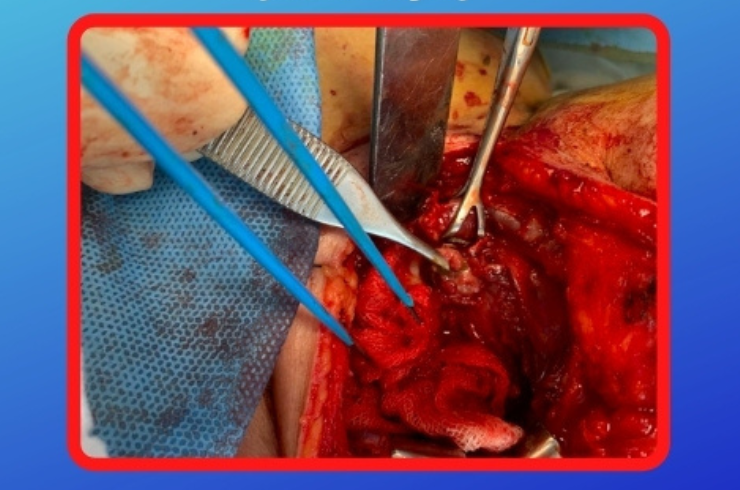Thyroid Surgery at Asian ENT Care Centre, Hyderabad
Thyroid surgery, or thyroidectomy, is a procedure in which the thyroid gland is partially or entirely removed. This surgery is commonly performed to treat thyroid tumors, thyroid dysfunction, and other related conditions. At Asian ENT Care Centre in Hyderabad, we offer advanced, patient-centered care for individuals requiring thyroid surgery. Our expert team ensures a safe, effective treatment plan tailored to each patient’s needs.
What Is the Thyroid Gland and Its Function?
The thyroid gland is a butterfly-shaped gland located at the base of the neck. Despite its small size, it plays a crucial role in the body’s overall functioning by producing thyroid hormones. These hormones are essential for regulating metabolism, energy levels, and the proper functioning of various organs and systems, including the heart, digestive system, and muscles.
- The thyroid produces two main hormones: T3 (triiodothyronine) and T4 (thyroxine).
- These hormones control how quickly the body uses energy, how sensitive the body is to other hormones, and how the body maintains normal growth and development.
- The thyroid uses iodine, which is absorbed from food, to produce these hormones.
When Is Thyroid Surgery Needed?
Thyroid surgery may be required for a variety of conditions, including:
- Thyroid Cancer: When cancerous cells are found in the thyroid, surgery is often needed to remove the tumor and prevent the cancer from spreading.
- Thyroid Nodules: These are lumps that can form in the thyroid gland, and they may need to be surgically removed if they are large, growing, or suspicious for cancer.
- Hyperthyroidism: A condition in which the thyroid produces too much thyroid hormone, leading to an overactive metabolism. Surgery may be recommended when other treatments like medication or radioactive iodine therapy are not effective.
- Goiter: An enlarged thyroid gland, which may cause difficulty swallowing or breathing. Surgery can help alleviate these symptoms if the goiter is large or problematic.
What Happens During Thyroid Surgery?
Thyroidectomy is typically performed under general anesthesia, meaning the patient will be asleep throughout the procedure. The surgeon makes an incision along the natural skin crease of the neck, making sure the scar is as discreet as possible. The extent of the surgery depends on the reason for the procedure:
- Partial Thyroidectomy: Only a portion of the thyroid gland is removed. This may be done if the problem is localized and not widespread.
- Total Thyroidectomy: The entire thyroid gland is removed. This is usually performed for thyroid cancer or if there is widespread disease in the gland.
- Lymph Node Removal: In cases of thyroid cancer, surrounding lymph nodes may also be removed to check for cancer spread.
The surgery typically takes 1 to 2 hours, but the duration may vary depending on the complexity of the procedure.
Post-Surgery Recovery
- Hospital Stay: After thyroid surgery, you will typically remain in the hospital for observation overnight. In some cases, a longer stay may be required depending on your recovery progress.
- Scar: You will have a small scar on the front of your neck where the incision was made. This scar is usually well-hidden within natural skin folds and fades over time.
- Thyroid Hormone Therapy: If your entire thyroid gland was removed, you will need to take synthetic thyroid hormones (levothyroxine) to replace the hormones your thyroid would normally produce. This medication is lifelong and helps maintain normal metabolism.
- Voice Changes: It’s common for patients to experience temporary hoarseness or changes in voice after surgery, especially if the nerves near the vocal cords are affected. Most patients recover fully within a few weeks.
- Swelling and Pain: Mild swelling and discomfort are normal after thyroid surgery. Pain is usually managed with over-the-counter pain relievers, though stronger medications may be prescribed if needed.
Potential Risks and Complications
Like all surgeries, thyroidectomy comes with some risks, although complications are relatively rare:
- Injury to the parathyroid glands: These glands are located near the thyroid and control calcium levels in the body. If damaged, it could lead to low calcium levels (hypocalcemia).
- Injury to the recurrent laryngeal nerve: This nerve controls the vocal cords, and damage could result in hoarseness or voice changes.
- Infection: As with any surgery, there’s a risk of infection at the incision site.
- Bleeding: Although rare, excessive bleeding may occur.
Why Choose Asian ENT Care Centre for Thyroid Surgery?
- Experienced Surgeons: Our team of expert ENT surgeons specializes in thyroid surgery, ensuring that you receive the best possible care.
- Comprehensive Care: From pre-surgery assessments to post-surgery follow-up, we provide comprehensive treatment at every stage of your thyroid care journey.
- Advanced Technology: We use the latest diagnostic and surgical techniques to ensure the safest and most effective treatment for thyroid conditions.
- Personalized Treatment: Each patient receives a personalized treatment plan tailored to their specific needs, helping them achieve optimal health outcomes.
- Post-Surgery Support: Our team offers rehabilitation and follow-up care, including thyroid hormone therapy, to ensure that you recover fully and maintain normal thyroid function.
Book a Consultation Today
If you’re experiencing symptoms such as difficulty swallowing, a lump in your neck, unexplained weight changes, or if you’ve been diagnosed with thyroid issues, contact Asian ENT Care Centre in Hyderabad for expert care. Our skilled team can help determine the best treatment plan for your thyroid condition and guide you through the surgery and recovery process.
